Steps to Creating an Effective Manufacturing Waste Management Plan
February 14, 2025
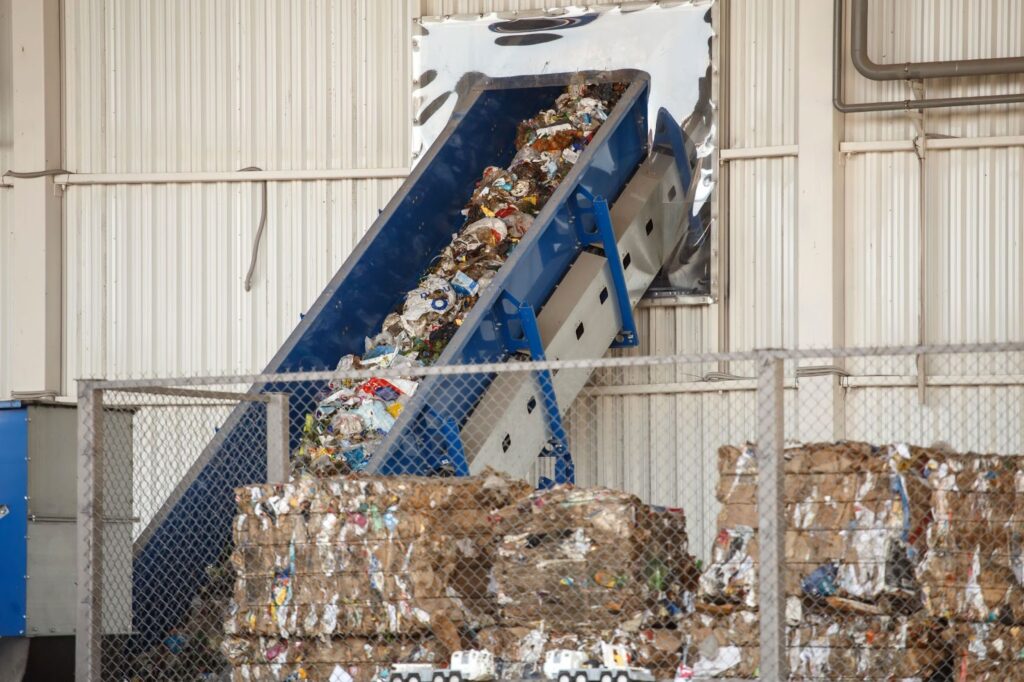
Imagine turning waste from a cost into a profit-generating resource. With an effective plan, your manufacturing process can be leaner, more sustainable, and cost-efficient.
Waste management does not need to be complex when you break it down into simple, actionable steps. Let us guide you through building a manufacturing waste management plan that is practical, eco-friendly, and profitable. But first, let us start with the basics.
What is a Manufacturing Waste Management Plan?
A manufacturing waste management plan is a structured approach designed to handle waste generated during the production process. It outlines strategies for reducing, reusing, recycling, and disposing of waste responsibly.
The plan ensures compliance with environmental regulations. It also improves cost efficiency and supports sustainability goals.
Through identifying waste sources, setting reduction targets, and implementing best practices, you can minimise environmental impact while enhancing operational productivity.
Need help with your manufacturing waste management? GreenTec Energy, an NEA-licensed waste management company, provides tailored solutions to handle your waste efficiently and responsibly. Call us today at (65) 6261 1377 or (65) 6261 1947, or email us at sales@gte.sg. Let’s discuss how we can optimise your waste management plan!
Without further ado, here is a step-by-step guide to help your business implement a successful manufacturing waste management plan that is practical, cost-effective, and environmentally responsible.
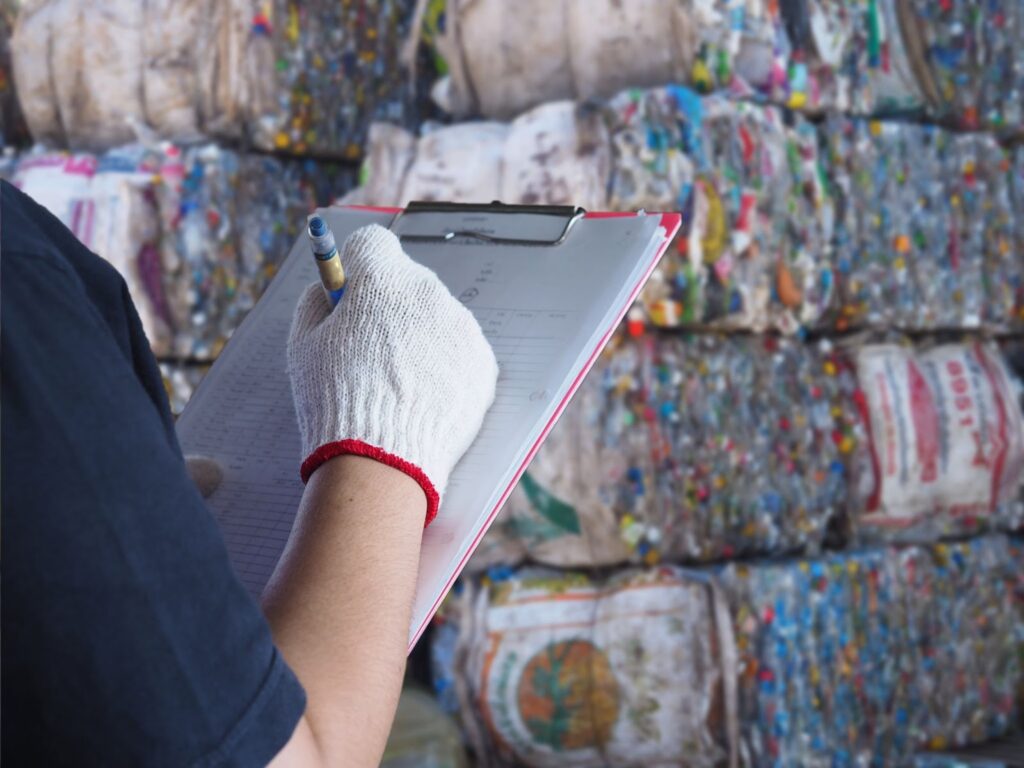
1. Assess Your Current Waste Management Practices
Before improving, you need to understand your starting point. Begin with a thorough audit of your current waste management practices. Identify:
- Types of waste generated. For example, scrap metal, plastic, packaging materials, or hazardous chemicals.
- Sources of waste from various stages of your manufacturing processes.
- How waste is currently stored, transported, and disposed of.
Collect detailed data to provide insights into inefficiencies. This helps you spot areas that require immediate attention. You can use tools like waste tracking systems and spreadsheets to document the volume and types of waste over a period.
This step also helps you determine the financial impact of your current waste handling practices.
For example, if your factory produces large amounts of metal shavings, tracking the generated waste and scrap sales can reveal opportunities to reprocess materials in-house. This can reduce raw material costs.
Learn more: Driving Sustainability: The Importance of Waste Tracking and Reporting

2. Set Clear Waste Management Goals
Define specific and measurable goals for your waste management plan. Clear targets keep your efforts focused and progress trackable. Examples of waste reduction goals might include:
- Reducing scrap material by 20% within six months.
- Increasing recycling rates for packaging waste.
- Minimising hazardous waste disposal costs.
When setting these goals, consider using the SMART framework (Specific, Measurable, Achievable, Relevant, and Time-bound) to ensure that your objectives are practical and actionable.
For instance, rather than aiming to “reduce waste,” specify, “reduce packaging waste by 15% in the next quarter by implementing reusable packaging solutions.”
Businesses in the electronics industry might aim to reduce e-waste by refurbishing defective components rather than discarding them. Setting precise targets with timelines ensures continuous progress.
Learn more: How to write SMART goals
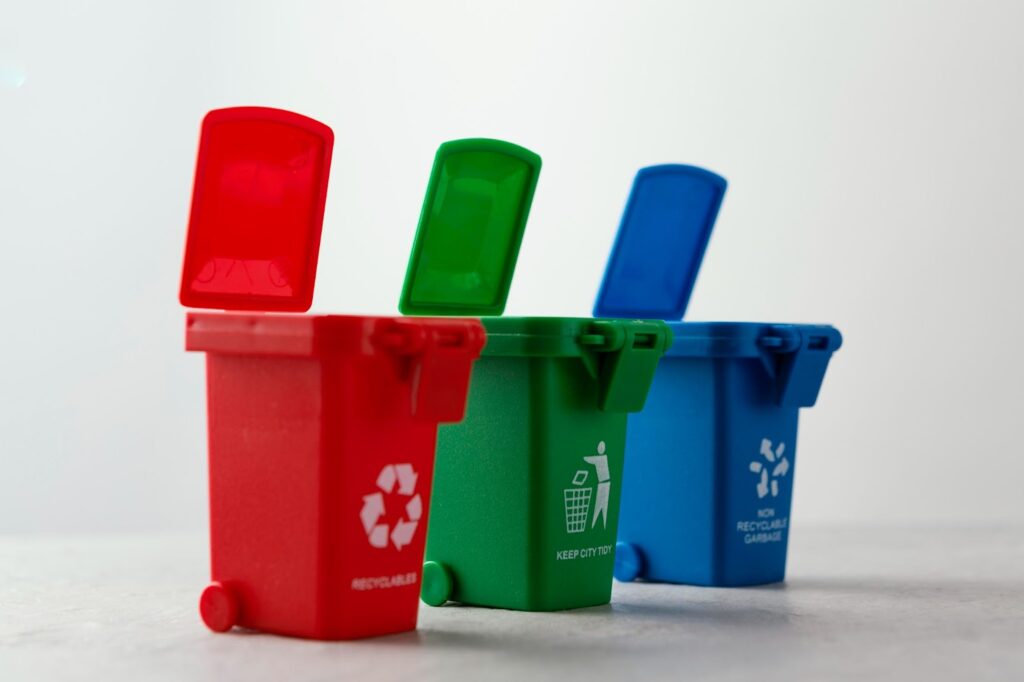
3. Classify Waste for Better Management
Not all waste is the same. Categorising waste helps you apply tailored management strategies. Common classifications include:
- Recyclable waste: Metals, plastics, paper, and cardboard.
- Hazardous waste: Chemicals, solvents, or by-products requiring specialised handling.
- General waste: Materials that cannot be recycled or reused.
Proper classification improves sorting accuracy. It also reduces contamination and ensures compliance with local regulations.
Use clearly labelled bins and designated disposal areas to make segregation easier for employees. This prevents recyclable materials from being mixed with non-recyclables, which increases disposal costs.
Consider partnering with a local recycling firm to ensure a smooth process for collecting and processing different waste streams. This will reduce the risk of non-compliance fines.
Handling toxic and hazardous waste is complex and requires precise disposal. We provide compliant and environmentally responsible toxic waste management services in Singapore. Protect your business and the environment – call (65) 6261 1377 or (65) 6261 1947, or email us at sales@gte.sg to get started today!
Learn more: Types Of Hazardous Waste Disposal Methods Usually Used
4. Reduce Waste at the Source
Prevention is always better than managing the aftermath. Find ways to reduce waste before it is created:
- Optimise manufacturing processes to use fewer raw materials.
- Switch to materials that produce less waste.
- Adopt lean manufacturing principles to minimise overproduction and defects.
For example, recalibrating machinery to reduce excess material or switching to precision cutting technology can significantly decrease waste.
Moreover, you can streamline production schedules to avoid overproduction. This helps minimise surplus stock that eventually becomes waste.
Industries using injection moulding can benefit from optimising mould designs. Doing so minimises leftover resin. Thus, reducing both raw material use and disposal needs.
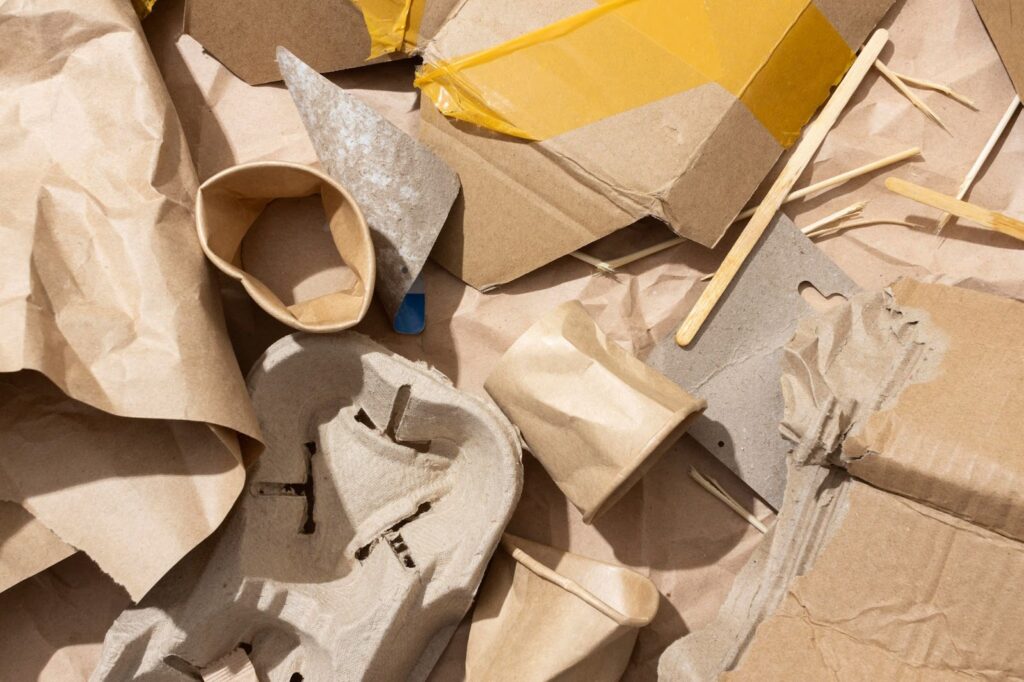
5. Reuse and Recycle Waste Material
Waste does not always need to be discarded. Explore opportunities to reuse or recycle by-products. Consider these strategies:
- Reusing scrap materials in production.
- Partnering with recycling firms for specific waste streams.
- Investing in equipment that reprocesses waste into usable materials.
For instance, metal shavings from machining can be melted down and reused. Many companies also find value in selling recyclable waste like cardboard or plastics to recycling businesses. Doing this turns waste into an additional revenue stream.
Research local and international recycling partnerships to expand your options.
Additionally, use closed-loop recycling systems where waste materials are fed back into your production line. This reduces the need for virgin resources and lowers waste disposal costs.
Finished sorting your recyclables? Great – now let us take it from here! We handle recyclable materials responsibly and efficiently, so nothing goes to waste. Give us a ring at (65) 6261 1377 or (65) 6261 1947, or drop us an email at sales@gte.sg to schedule your pickup.
Learn more: The types of manufacturing waste and 10 ways to reduce them
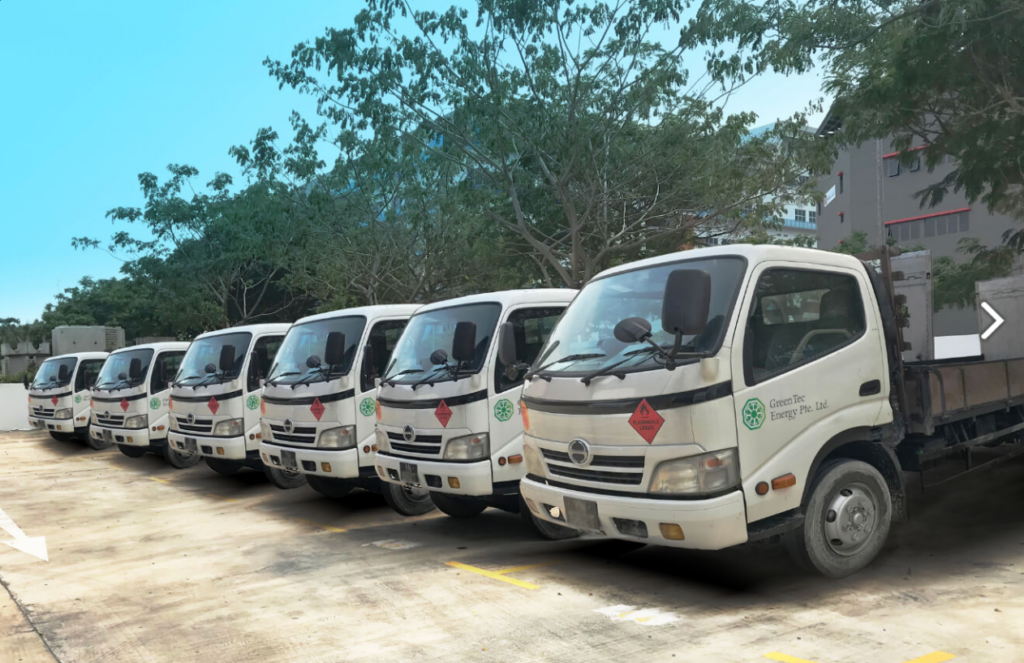
6. Partner with Waste management Providers
You do not need to manage everything alone. Working with a professional waste management service ensures proper handling of complex waste types. Choose providers who:
- Offer tailored recycling programmes.
- Comply with local and national regulations.
- Provide detailed reports on waste collection, recycling, and disposal.
Look for partners that provide consultancy services to help optimise your processes. Some providers can offer training sessions or recommend the latest technologies for efficient waste reduction.
Collaborating with a reliable partner saves time, improves compliance, and reduces environmental risks.
Ready to take your business to greener heights? Partner with us today to ensure your manufacturing waste is recycled or disposed of responsibly and in full compliance with the law. Call (65) 6261 1377 or (65) 6261 1947, or email us at sales@gte.sg to get started!
7. Train Employees on Waste Management Procedures
Your workforce plays a vital role in the success of your manufacturing waste management plan. Provide comprehensive training on:
- Correct waste segregation practices.
- Safe handling of hazardous materials.
- Company policies for reducing and managing waste.
Use visual aids, workshops, and hands-on training to reinforce learning. Employees who understand the impact of their actions on waste reduction are more likely to adhere to proper practices. Encourage team feedback to identify overlooked waste issues and innovative reduction ideas.
Engage employees with incentive programmes to reward departments that achieve the greatest waste reductions. This creates a culture of sustainability and motivates continuous improvement.

8. Monitor, Review, and Improve the Plan
A waste management plan is not static. It needs regular evaluation and adjustments. Schedule periodic reviews to:
- Measure progress against your initial goals.
- Identify new waste streams or inefficiencies.
- Implement updated technologies or processes.
Use data-driven insights to refine your plan continuously and achieve better results. Track key performance indicators to evaluate success. Such as, waste-to-product ratios, recycling rates, and cost savings.
Implement automated waste tracking software to simplify monitoring and generate real-time reports.
Companies that utilise IoT-enabled sensors can track waste generation in real-time. This provides actionable insights to adjust processes swiftly and reduce inefficiencies.
Learn more: Guide 101: How to Use the Toxic Industrial Waste E-tracking by NEA

The Benefits of Having a Manufacturing Waste Management Plan
A comprehensive manufacturing waste management plan offers your business numerous benefits, including:
- Cost Reduction
Through reducing waste generation and improving recycling processes, you can lower disposal costs and reclaim valuable materials. - Regulatory Compliance
Staying compliant with environmental regulations minimises your risk of facing legal issues and costly fines. - Enhanced Efficiency
Streamlined waste management processes improve your production efficiency. This reduces downtime and waste-related disruptions. - Environmental Sustainability
Responsible waste handling contributes to resource conservation, lower greenhouse gas emissions, and a cleaner environment. - Reputation and Competitive Edge
Companies known for sustainable practices are more attractive to environmentally conscious consumers and partners. A robust plan enhances your brand’s reputation and builds trust in the market.
These benefits demonstrate how a proactive approach to waste management goes beyond mere compliance. It positions your business as a responsible industry leader committed to sustainable growth and innovation.
Conclusion
Creating an effective manufacturing waste management plan is a strategic step towards sustainability and profitability. By following the steps above, you can transform waste management into a competitive advantage for your business.
Empower your team with the right training. And, often review your strategy to stay ahead in today’s eco-conscious business landscape.
Stay proactive, adaptable, and committed to continuous improvement. Your business will reap long-term benefits both environmentally and financially.
Got questions about waste management plans? Or ready to explore tailored waste management solutions for your business? Contact us today at (65) 6261 1377 or (65) 6261 1947. You can also email us at sales@gte.sg. Let's create a smarter, greener strategy together!
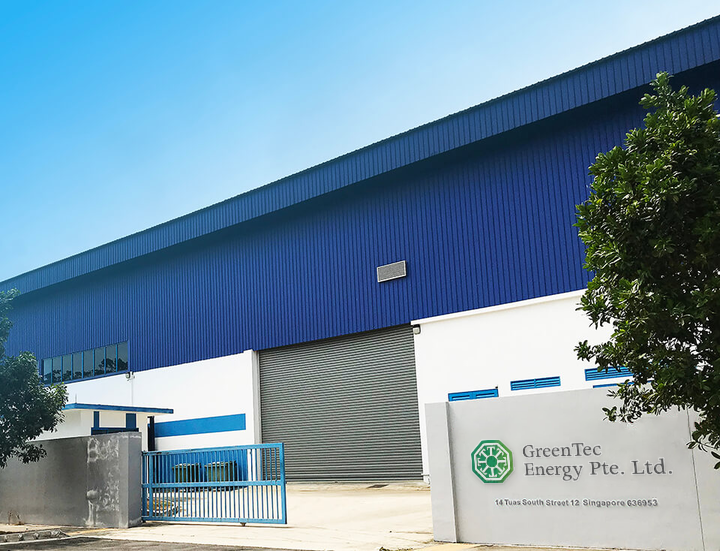 GreenTec Energy Pte Ltd (GTE) is a waste management company located in Tuas, Singapore.
GreenTec Energy Pte Ltd (GTE) is a waste management company located in Tuas, Singapore.
Our service includes Industrial waste, Oily waste, Marine waste.
To provide a hassle free solution to our customer is always the key approach and to ensure a win-win situation towards. As a NEA approved environmental company in Singapore, we take all our services seriously and to ensure maximum safety with compliances applied. Every step of our disposal processes are also designed to meet NEA & SCDF requirements, with latest treatment facilities and laboratories to test and treat all incoming waste before disposal.
GTE operates a total land area of about 100,000sqft at 14 Tuas South Street 12 Singapore 636953. With our comprehensive logistics and transportation fleet, we provide prompt and efficient services in transportation of waste to our premises.



